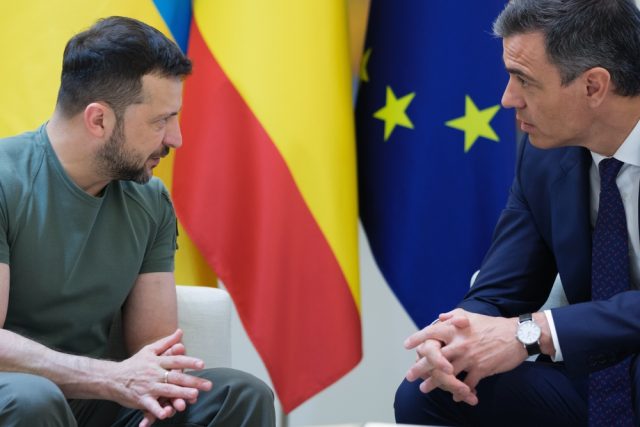
In Brussels and Washington alike, a conclusion has taken hold: Spain is no longer at the table where Europe’s strategic future is being decided. The episode that diplomats now refer to as the formation of the “Washington Group”—the cluster of European leaders who accompanied Volodymyr Zelensky to the United States last summer and stood beside him in the Oval Office—has become emblematic of this drift. France, Germany, Italy, the United Kingdom, and the European institutions rallied around a common declaration supporting Ukraine and exploring a framework for peace. Spain, conspicuously, was not invited.
When the document appeared, Madrid first dismissed it as one among many joint statements. But within hours, realising its symbolic weight, Moncloa reversed course and requested to sign on—too late to disguise the fact that Spain had been excluded from the discussions that mattered. The episode captured what many in Europe now perceive as the hallmark of Pedro Sánchez’s diplomacy: a reactive posture, anxious to appear aligned yet chronically out of step with the rhythm of Western coordination.
The problem, however, runs deeper than a missed signature. For Washington, Spain has become a test case of NATO complacency. Few allies have invested so little in their own defence, and Donald Trump—back in the White House and newly emboldened—has made Madrid a personal example of what he calls “strategic freeloading.” In recent months he has accused Spain of failing to meet even minimal Alliance targets, warning that allies who refuse to spend will be left to defend themselves. The tone is not rhetorical; it is punitive.
This marks a profound shift. For decades, defence contributions were a technical issue discussed in bureaucratic tones within NATO. Today, they have become a political dividing line. The fact that Spain is the only member state resisting the new five-per cent goal has placed it in open friction with Washington—an unprecedented rift in the transatlantic relationship.
Sánchez’s response has been to redefine what “defence” means. His government argues that spending on natural disasters, climate resilience, and cybersecurity should all count toward NATO commitments, folding these civilian priorities into the military ledger. Roughly thirteen per cent of Spain’s 2025 defence budget is earmarked for such purposes—a gesture meant to reconcile fiscal restraint with moral grandstanding. Brussels has pushed back, reminding Madrid that “green” projects do not qualify as rearmament and cannot be included if Spain hopes to access EU defence funds. What Madrid calls modernisation, others see as creative accounting.
Behind this semantic manoeuvre lies a deeper conceptual flaw. Spain still treats defence as a political nuisance rather than an investment in sovereignty. The contrast with its European peers—many of which have embarked on long-term rearmament plans—has become glaring. Defence spending is not consumption; it is capital formation. It sustains credibility, deterrence, and industrial innovation. Without it, the moral claims of solidarity or “European leadership” collapse into rhetoric.
Washington’s frustration with Madrid is compounded by what officials describe as an erratic foreign policy. While other European governments have tightened their alignment with NATO priorities, Spain has cultivated ties that appear designed to irritate its allies. Moncloa has repeatedly softened its stance toward Nicolás Maduro’s regime in Venezuela and sought a privileged channel of cooperation with Beijing under the language of “strategic autonomy.” These gestures, seen in Washington as ideological rather than strategic, have reinforced the perception that Spain under Sánchez aspires to play mediator between rival blocs without the leverage to do so.
The result is isolation. When the leaders of the Washington Group drafted a plan for Ukraine, Spain was informed after the fact. When Trump now speaks about NATO reform, Madrid is mentioned only as an example of what must change. In Brussels, Spain’s creative redefinition of defence has drawn thinly veiled scorn; in Washington, it has provoked open irritation.
There is, however, a lesson in this estrangement. The return of power politics has made clear that defence is not an ideological choice but a civilisational instinct. It is the precondition for everything else—prosperity, social policy, and even environmental ambition. To treat it as secondary is to misunderstand the logic of freedom itself.
Trump’s rebuke may have sounded undiplomatic, but it expressed a truth that Europe, and Spain in particular, can no longer ignore. The age of strategic comfort is over. Those who fail to invest in their own security will soon find themselves paying a higher price in lost influence, economic pressure, or strategic vulnerability.
For Spain, the path back to credibility is clear. It is not to seek prestige through late signatures or moral lectures, but through consistent, measurable commitment: a sustained rise in defence spending, a coherent foreign policy anchored in the transatlantic alliance, and an understanding that strength is the foundation of peace.
Until then, Spain will remain what the Washington Group episode has already revealed it to be—a country present in the margins of the photograph, but absent from the decisions that shape the world.



 Subscribe
Subscribe